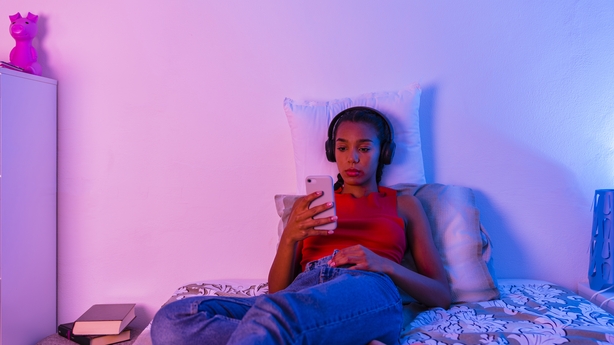Earlier this week Jennifer Zamparelli spoke with Carolyn Bunting, CEO of internetmatters.org, about how we can switch off from our tech devices.
Research has found that only one in five families in Ireland sit down for dinner together without having any devices present, whether it be a phone or a TV.
The Vodafone study, which surveyed 1,600 parents with a least one child at home, revealed that 61% of parents say that getting their children to switch off devices is one of the biggest causes of disagreement in their household.

"It's a difficult challenge for parents," Carolyn told Jen "What parents need to remember is that most of the apps and games and sites that our children use are really designed, by very clever people, to make them stay on as long as possible."
As well as having kids stuck into their phones, Jen admits that parents may to be blame as she herself uses the television as a distraction to help her 4-year-old eat his vegetables.
Not only that, but some adults are as hooked on their phones as their children, which Carolyn says is understandable given how reliant we all were on technology for connectivity and information during the pandemic.
"If you're connected to your device 24/7, its sort of reasonable to expect your child will think similarly about their device and actually exhibit similar behaviours to you," she says.

Not all screen time is bad. There are plenty of educational apps and intellectual games being created for children and adults alike (have you cracked today's Wordle?). However, the amount of time spent on devices is something to be wary of.
While rules can be set for younger children surrounding screen time, Carolyn suggests compromising with older children and teens and coming up with some situations where it will benefit everyone to step away from screens.
"Typical things that parents will do is: no tech before school, no tech an hour before bed time because we know the impact that technology can have in terms of unsettling sleep patterns, no tech until homework is done, no tech at meal times."

To give parents a helping hand, many devices will have screen time and wellbeing applications that will help keep track of how long a user has been spending online and give them a push to put the device down after a set amount of time.
Ultimately, though, Carolyn believes consistency is key and setting ground rules will create good habits for kids and grown ups alike.
"If you have consistent rules like no tech at meal time or no tech until homework is done, those become frameworks that children respond well to because they know the rules. I think what's harder for children is they're on their devices one day and you're moaning at them but the next day you're not, so they don't understand the difference."
For more tips on internet safety and cutting down on screen time, listen back to The Jennifer Zamparelli Show on RTÉ 2fm above.

